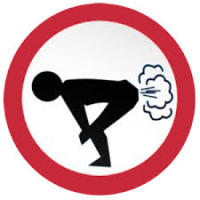Find out the truth about farts! Check out the article we found at Dr Axe.
Are Farts Bad for You? Can Flatulence Actually Be Beneficial?
Farting is considered a normal reaction within the human body and something we all deal with at one time or another. Because it’s the act of releasing internal gas from the body, just like a burp or even breathing, it’s usually harmless and in fact needed for normal metabolic functions.
Most of the time your farts are just inconvenient but not something to necessarily get riled up about. In fact, they might even be protective in some instances! That’s right — your farts might be a clue that your “gut bugs” are well-fed and working hard, and that your diet is a mostly healthy one. Diets high in fiber-rich foods after all tend to cause gas, but they also feed good bacteria that make up your immune system and protect you from various diseases, like heart disease, cancer, diabetes and obesity.
Aside from being a sign that your eating plenty of fiber, gases within your farts might even be beneficial. While this isn’t exactly a proven fact yet, there’s some early evidence suggesting that farts offer protection against diseases like cancer because of the specific gases they contain.
Farts contain hydrogen sulphide, a gas produced by certain natural bodily processes and needed as part of cellular functions. While I wouldn’t necessarily go smelling yours, or anyone else’s, farts just yet, it’s possible that inhaling hydrogen sulphide (yes, from your very own farts!) in small doses might help protect cells’ mitochondria and stop cellular damage at some level.
On the other hand, excessive farting can be a sign that digestive processes are going amuck, even that an underlying issue might be blame.
Some underlying reasons for excessive gas accumulation can include:
- food sensitives or intolerances (see the list of common culprits below)
- fermentation of bacteria within the gut from eating FODMAP foods
- leaky gut syndrome or digestive disorders, including Crohn’s, celiac disease and irritable bowel syndrome (IBS)
- constipation
- SIBO (small intestinal bacteria overgrowth)/excessive bacteria in the small intestine. Normally food intermingles with digestive juices in the intestines and nutrients are absorbed into the bloodstream while waste is sent to the colon. But with SIBO, malabsorption occurs, particularly of fat-soluble vitamins and iron, leading to abnormal bacteria growth and gas.
How do you know if your gas is something to actually be worried about? Check if you experience other warning signs at the same time as being very gassy. When you’re up against a lot of flatulence, look for other abnormal symptoms including:
-
weakness or fatigue
-
skin rashes, acne or hives
-
signs of allergies, like watery eyes, itchy throat
-
constipation or diarrhea
-
blood in your urine or stool
-
pain around your lymph nodes, including in your groin, throat or armpits
-
changes in your body temperature, weight, sleep and menstrual cycle
How to Stop Flatulence: The Keys to Finding Gas Relief
If you find yourself repeatedly dealing with bad gas, the first thing to do is your address your diet. You might be having trouble breaking down certain foods or experiencing an accumulation of sulfur, bacteria or yeast.
The tendency for foods to cause excessive gas varies from person to person considerably, so it usually takes some trial and error to figure out what your biggest triggers are. That being said, there are some “common culprits” in the world of farting that are likely involved in your struggle.
Next Article: 5 Ways To Get Rid Of Gas And Bloating Naturally
Read Full Article: Is Flatulence Good For You? Depends on the Smell?







Recent Comments